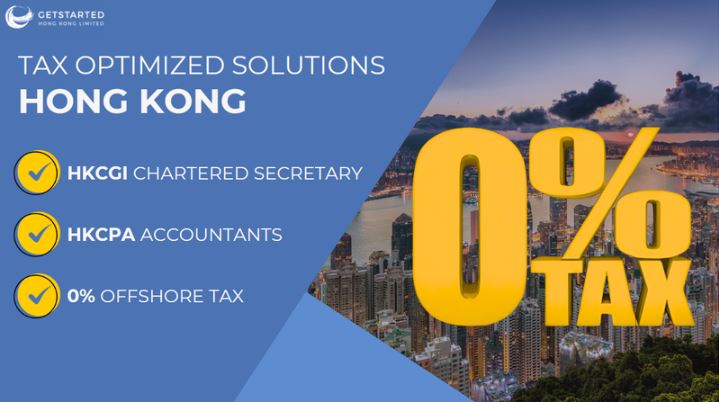Most firms charge UPFRONT on accounting, but not us.
Get Started HK runs on solid cashflow and startup-first values. You won't pay a cent for first accounting or audit until 18 months in, when your business is up and running. 🚀 Learn more
In 2023 alone, over 130000* companies were incorporated in Hong Kong. 90%* more than Singapore.
Hong Kong offers an internationally recognized and highly favorable tax environment for businesses operating globally. Companies incorporated in Hong Kong enjoy significant tax benefits due to the region’s territorial tax system, which taxes only income generated within Hong Kong. Income earned outside of Hong Kong can benefit from substantial tax savings, 0% tax will be collected.
In 2020, accounting firm PwC and the World Bank ranked Hong Kong as having the world’s second most business-friendly tax system, surpassed only by Bahrain. This accolade highlights Hong Kong’s commitment to maintaining a competitive and efficient tax regime that supports international business operations.
Moreover, Hong Kong’s unique position under the “One Country Two Systems” principle grants it a high degree of autonomy from mainland China. This autonomy allows Hong Kong to maintain its own legal and economic systems, including a transparent legal framework based on English common law. The region’s robust legal protections and commitment to confidentiality make it an attractive jurisdiction for establishing offshore company formation, offering a stable environment for businesses to thrive.

Since its establishment as a British colony in 1842, Hong Kong has been a key destination for businesses seeking to expand and thrive in a dynamic global market. It became a center for commerce in East Asia, thanks to its deep natural harbor and strategic location. Over the decades, Hong Kong has evolved into a global financial powerhouse, attracting businesses with its free-market economy, robust legal system based on English common law, and transparent regulatory framework.
In 2024, Hong Kong continues to be highly competitive, thanks to its business-friendly policies, a highly skilled workforce, and access to one of the world’s largest stock exchanges, making it a preferred choice for entrepreneurs and corporations alike. This dynamic relationship can be likened to that of a mother and daughter, with Hong Kong drawing strength and resources from China while maintaining its unique identity and adaptability. The city’s enduring appeal lies in its ability to navigate this connection and remain at the forefront of international commerce.

From business owners looking to expand their portfolio to aspiring entrepreneurs exploring new ventures, Hong Kong will be the perfect place to set up a new company, for the following reasons:
a) #1st in the Asia Financial Centres Index
Hong Kong is ranked the first amongest top global financial hubs in Asia, third in the world. Just behind New York and London.
b) No Restrictions on Foreign Ownership
Unlike many jurisdictions, Hong Kong imposes no restrictions on foreign ownership of companies. This means international entrepreneurs can own 100% of their Hong Kong companies without the need for local partners, providing full control over business decisions and profits.
c) Internationally Aligned Regulatory System
The regulatory framework in Hong Kong aligns with international standards, ensuring transparency, fairness, and confidence for investors and entrepreneurs.
d) Free-Trade Practices
Hong Kong operates one of the most liberal trade regimes in the world. With no tariffs on imports and exports, minimal restrictions on foreign investments, and no quotas, businesses enjoy the ease of trading goods and services globally. This commitment to free trade reduces costs and barriers, facilitating smooth international business operations.
e) UK-Based Legal System
Hong Kong’s legal system is based on English common law. This provides a familiar and reliable legal framework that upholds the rule of law, offers strong protection for property rights, and enforces contracts effectively. Such a system instills confidence in businesses regarding dispute resolution and legal matters.
f) Interconnected with China through “One Country Two Systems”
Under the “One Country Two Systems” principle, Hong Kong enjoys a high degree of autonomy from mainland China, maintaining its own economic, legal, and administrative systems. This unique arrangement offers businesses the best of both worlds.
At Get Started HK, we offer comprehensive Hong Kong offshore company formation services. We ensure your company is optimally positioned to leverage all the advantages that Hong Kong provides. Our expertise guides you through every step, from incorporation to navigating regulatory requirements, so you can focus on growing your business and capturing new opportunities in this region.
In addition to offshore company formation, we also provide bookkeeping, accounting, and auditing services, ensuring your financials stay compliant with Hong Kong’s regulations while you focus on scaling your business with ease and confidence.
After offshore company formation, to qualify for offshore tax status in Hong Kong, a company must demonstrate that it does not have significant business activities or a physical presence within the region. Specifically, the company must ensure it has none of the following:
Qualification Criteria
Details
Business Activities
Physical Presence
Operational Infrastructure
Directors’ Residency
Once a company qualifies for offshore status, this status typically remains valid for 3 to 5 years, depending on the nature of the business. After three years, the company can apply to renew its offshore status, which requires an investigation conducted by the Inland Revenue Department (IRD). You must submit an audit report prepared by Get Started HK to apply for offshore status, ensuring compliance with all necessary regulations.
Hong Kong’s territorial tax system allows companies to benefit from tax exemptions on income earned outside its borders.
Type of Income
Description
International Contracting
Profits from contracts negotiated, signed, and executed entirely outside Hong Kong. No Hong Kong involvement.
Global Trading
Income from buying and selling goods where both procurement and delivery occur outside Hong Kong. Goods do not enter Hong Kong.
Overseas Services
Revenue from services performed wholly outside Hong Kong, including consulting and professional services.
E-commerce
Earnings from online sales where order processing, payment, and product deliveries are managed outside Hong Kong.
Intellectual Property (IP) Utilization
Royalties and licensing fees from the use of patents, trademarks, or copyrights by entities outside Hong Kong.
Foreign Real Estate Income
Profits from the sale, rental, or management of real estate properties located outside of Hong Kong.
Income from Overseas Subsidiaries
Dividends or repatriated profits from subsidiaries conducting business entirely outside Hong Kong.
These examples illustrate the types of income that may be considered offshore-sourced under Hong Kong’s tax laws. To qualify for tax exemption, companies must provide sufficient evidence that these income-generating activities are conducted wholly outside Hong Kong, complying with the requirements set by the Inland Revenue Department (IRD).

To support an Offshore Tax Claim (OTC), entities should maintain and provide comprehensive accounting records and documentation. These records are essential for verifying the offshore nature of your income and substantiating your claim with the Inland Revenue Department (IRD). The required documents include, but are not limited to:
Contracts and Agreements
Documents that demonstrate negotiations and executions of contracts took place outside Hong Kong. This includes signed agreements, terms of service, and any contractual correspondence indicating offshore activities.
Financial Records
Invoices, receipts, and bank statements that trace the flow of funds related to business activities conducted outside Hong Kong. These records should align with the offshore operations and show that transactions were executed through foreign banks or financial institutions.
Email Correspondence
Communications that provide evidence of business decisions made and actions taken outside Hong Kong. This includes emails with clients, suppliers, and partners that detail negotiations, agreements, and operational directives.
Outsourcing Documentation
Records highlighting economic substance, such as contracts with third-party service providers located outside Hong Kong. This demonstrates that certain business functions are performed offshore, reinforcing the claim of offshore income.
Economic Substance Records
Detailed information about employees working outside Hong Kong, office leases for premises located abroad, operational expenses, and other expenditures that establish the company’s economic presence outside Hong Kong.
Maintaining these documents not only supports your OTC but also ensures compliance with regulatory requirements, making the audit process by the IRD more straightforward and increasing the likelihood of a successful offshore tax claim for you offshore company formation.
Additional Basic Information Required (Upon request)
Alongside the detailed records and documentation, the company must also submit the following basic information to support its Offshore Tax Claim upon request:
This basic information complements the comprehensive documentation and helps establish the company’s operational context, supporting the claim of offshore income and activities, ensuring a smoother process for offshore company formation and tax exemption benefits.

When considering locations for offshore company formation, Hong Kong and Singapore are often compared due to their status as leading global financial hubs. Both cities offer favorable environments for business, but key differences can make one a better fit depending on your needs. Below are some key considerations to help you choose the right jurisdiction for your company incorporation:
Aspect
Hong Kong
Singapore
Tax Rate
Hong Kong:
8.25% for the first HKD 2 million profit
16.5% thereafter
Singapore:
17% for all profits
Goods and Services Tax
Hong Kong:
0%
Singapore:
9%
Capital Gains Tax
Hong Kong:
0%
Singapore:
0%
Tax on Foreign Income
Hong Kong:
Not taxable (0%)
Singapore:
0% if not remitted to Singapore
Foreigners’ Benefits
Hong Kong:
Singapore:
Political Stability
Hong Kong:
Singapore:
Are Offshore Company Formation Illegal?
No. This is false. Offshore corporations are completely legal. In reality, establishing and operating an offshore company is legal as long as it is conducted for legitimate business purposes and complies with the laws and regulations of the relevant jurisdictions. In Hong Kong, Get Started HK can help ensure your offshore company meets all legal compliance requirements. With over 26,000 satisfied customers, GSHK has the expertise to facilitate the smooth incorporation and ongoing management of your offshore company formation.
Are Offshore Company Formation Only for the Wealthy?
Many people assume that. However, businesses of all sizes can benefit from them through advantages such as asset protection, favorable tax rates, and access to global markets.
Are OffshoreComapny Formation Completely Tax-Free?
From our experience from offshore company formation and feedback from clients, not every offshore jurisdiction is truly tax-free. However, in Hong Kong, once your company obtains offshore status through our auditing and services, you can enjoy a 0% profits tax rate. This makes Hong Kong one of the few places where offshore status can lead to a truly tax-free business environment when properly structured with the right compliance.
At Get Started HK, we’re committed to making offshore company formation a seamless experience. Contact us today to learn how we can assist you in setting up your offshore corporation efficiently and legally.
References:
[1] Companies Registry (2024) Statistics – Local Companies Incorporated. Available at: https://www.cr.gov.hk/en/publication/fact-stat/statistics/local-companies-incorporated/since-2014.htm [2] ACRA Business Registry Statistics. (2023). Statistical Highlights 2023. Available at: https://www.acra.gov.sg/training-and-resources/facts-and-figures/statistical-highlights-2023 [3] Inland Revenue Department (IRD) (2021). A Simple Guide on The Territorial Source Principle of Taxation. Available at: https://www.ird.gov.hk/eng/paf/bus_pft_tsp.htm [4] GovHK (2023). GovHK: Tax Rates of Profits Tax. Available at: https://www.gov.hk/en/residents/taxes/taxfiling/taxrates/profitsrates.htm [5] Inland Revenue Authority of Singapore (IRAS) (2023). Taxes. Available at: https://www.iras.gov.sg/taxesSuite C, Level 7, World Trust Tower, 50 Stanley Street, Central, Hong Kong
See Our Offices